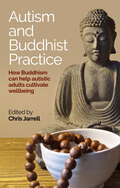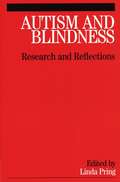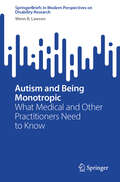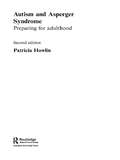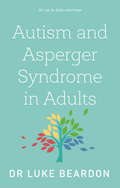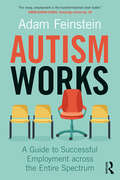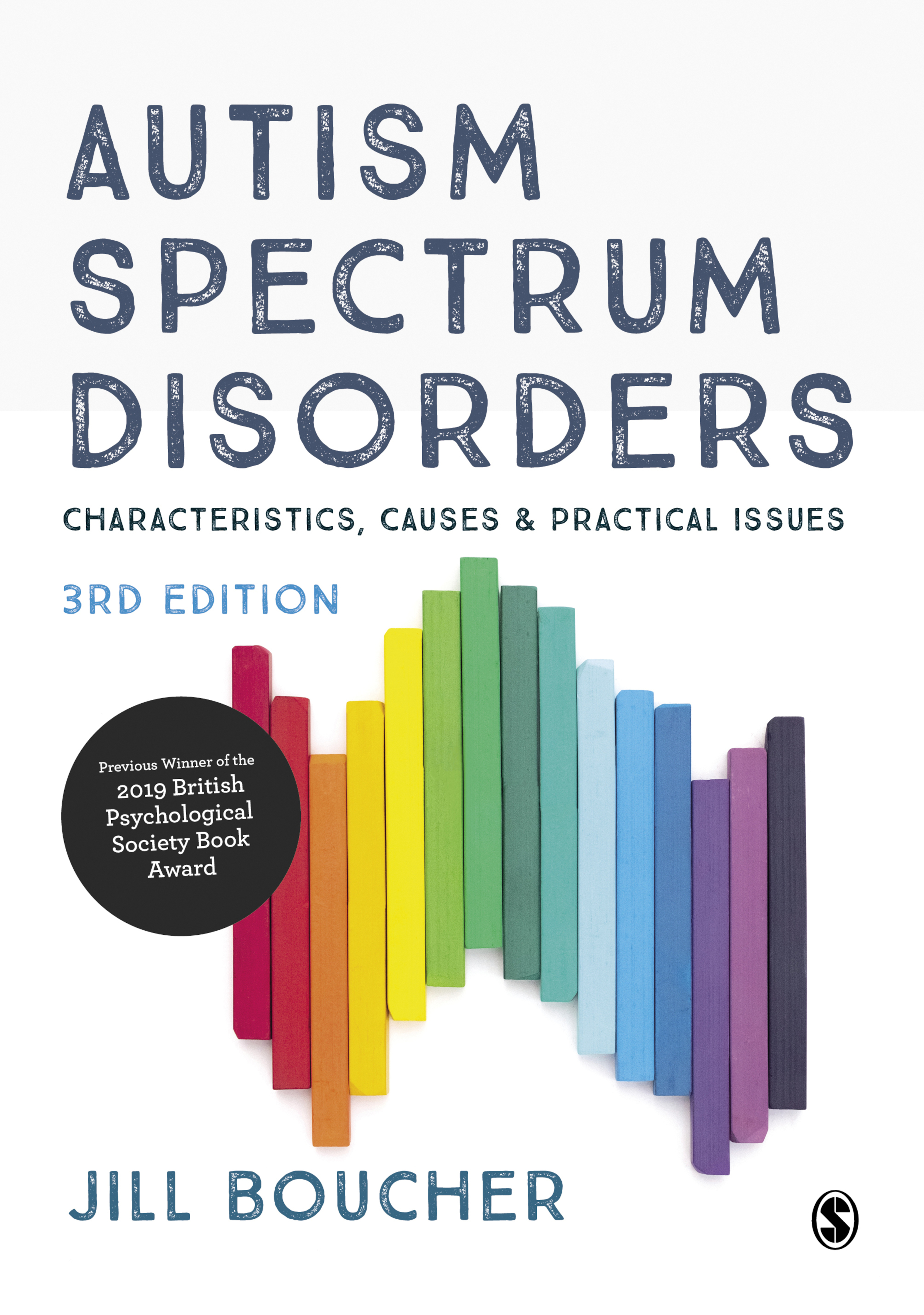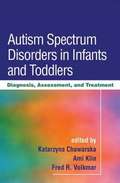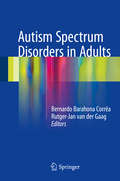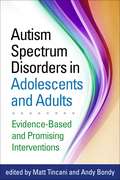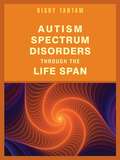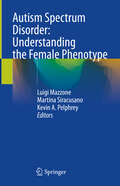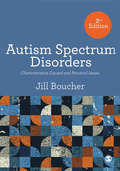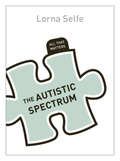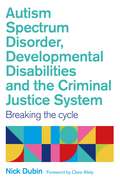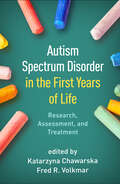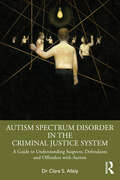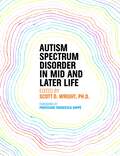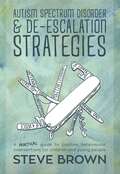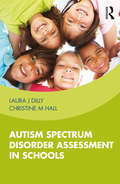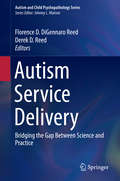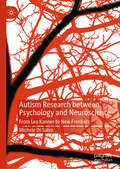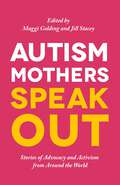- Table View
- List View
Autism and Buddhist Practice: How Buddhism Can Help Autistic Adults Cultivate Wellbeing
by Chris JarrellThis series of reflective accounts explores the benefits that Buddhist practice can bring for autistic individuals, and outlines how Dharma teachers, centre directors and meditation group leaders can help ensure sessions are truly autism sensitive.Including a wide range of international contributors discussing aspects of their autistic experience and the impact of Buddhism on their lives, this is a thought-provoking and often moving portrayal of the intersect between the lived experience of autistic people and spiritual practice. The deeply personal accounts of the positive impact Buddhist practices have had on relationships, social interactions, sensory overload, mental health and wellbeing, provide an opportunity to find out more about both Buddhism and the support that it can offer to the autistic community through, for example, personal practice, parenting and special educational provision.
Autism and Blindness: Research and Reflections
by Linda PringThis book has brought together leading international experts to explore the similarities and the differences between autism and blindness. Current research with children as well as adults is described comparing early psychological development from a range of perspectives such as language, memory, thought and feelings as well as providing critical reviews of educational and intervention programmes. New developments in the field have sparked debate that is well represented here and touches on a variety of issues ranging from musical talent to the basis of 'connectedness' to others. The readership will be drawn from many fields reflecting the interdisciplinary nature of the topic and will include researchers and practitioners in psychology and psychiatry as well as educationalists, therapists, classroom teachers and parents.
Autism and Being Monotropic: What Medical and Other Practitioners Need to Know (SpringerBriefs in Modern Perspectives on Disability Research)
by Wenn B. LawsonThis book provides a comprehensive overview of the experiences and challenges faced by autistics who have not been understood or accommodated due to their monotropic cognitive style. This book aims to increase understanding and awareness of monotropism, its tributaries (object permanence; external senses and connections to interoception) as well as offer a roadmap to aid and support autistic monotropic individuals. The topic of monotropism and its tributaries, as well as their impact upon quality of life, is vital for medical and allied professionals to comprehend. This book explains these terms and their role in autistic behaviour and fills a critical gap in the literature by providing a comprehensive resource that addresses the specific needs of this population.
Autism and Asperger Syndrome: Preparing for Adulthood
by Patricia HowlinAutism and Asperger Syndrome reviews what is known about adults with autism in terms of their social functioning, educational and occupational status. Focusing mainly on the problems experienced by high functioning people with autism - and those working with and caring for them - the book offers practical ways of dealing with their difficulties. Each chapter makes use of clinical case material to illustrate the kinds of problems faced and ways in which they may be overcome. First-hand accounts from people with autism are included and links with psychiatric illness in later life are explored.This updated edition is helpful to both professionals and families with autistic children and has been completely updated to take account of the latest research in the field. It also includes an additional chapter on the differences between autism and Asperger syndrome.
Autism and Asperger Syndrome in Adults
by Luke Beardon'Luke has years of valuable experience, and is always thinking and learning about autism' - Professor Nicola MartinHave you recently been diagnosed as autistic?Do you suspect you might be autistic?If you've recently been diagnosed as autistic, think you may be or are close to someone who is, one of the things you will like most about this book is the way in which it challenges the idea of autism as a 'disorder' or 'impairment'.Instead, Dr Luke Beardon will help you to reframe what you feel, and challenge what you know, about being on the spectrum. He explains how autism impacts on the individual, and what purpose a diagnosis might - or might not - serve. There is a lot of myth-busting, and dismantling of the stereotypes and clichés around ASD and areas like communication, social interaction and relationships. Practical tips for undiagnosed adults will help you navigate things like school, work, study, parenthood and even to understand what happens when autistic people break the law.Above all, this book is a celebration of what it means to be autistic - of the passion, honesty, humour, lack of ego, loyalty and trustworthiness that make you, or your loved one, such an amazing person.
Autism Works: A Guide to Successful Employment across the Entire Spectrum
by Adam FeinsteinPeople with autism are being left behind today, with only 16 per cent in full-time employment. This inspiring book addresses the lack of understanding of the wonderful contributions people across the autism spectrum can make to the workplace, drawing attention to this vast untapped human resource. Employers who create supportive workplaces can enhance their companies by making use of the talents of people with autism while also helping to produce a more inclusive and tolerant society, and people with autism can themselves benefit materially and emotionally from improved employment opportunities. Packed with real-life case studies examining the day-to-day working lives of people across the autism spectrum in a wide variety of careers, this book provides constructive solutions for both employers seeking to improve their workplaces and for individuals with autism considering their employment options. It dispels popular myths about autism, such as that everyone is good at IT, and crucially tackles the potential job opportunities available across the spectrum, including for those who have no language at all. It also highlights the neglected area of gender differences in the workplace and the costs of autistic females’ ability to 'camouflage' their condition. This book is a must-read for parents, employers and adults with autism, and for anyone interested in the present and future of people with autism in the workplace who will benefit from the positive message that employing autistic people is not an act of charity but one that makes sound economic sense.
Autism Spectrum Disorders: Characteristics, Causes and Practical Issues
by Jill BoucherWhat are the historical foundations of autism and what precisely is meant by the ′autistic spectrum′? How can we explain behavioural patterns of people with autism, young or old, and what are the major theoretical bases for understanding these? What is the latest thinking regarding diagnosis, and what are the most effective strategies for assessment, education and care for people on the autistic spectrum? From historical information to methods of assessment, and from intervention to education and support, this informative and accessible text explores theories at the psychological, neurobiological and ′first cause′ levels. This fully up to date Third Edition answers these questions with a strong practical focus, encompassing the latest research on autistic spectrum disorders. New features include: Further reading suggestions Glossary of technical terms Updated information on autism support services Personal illustrative examples Jill Boucher is a retired academic psychologist. Her most recent post was Professor of Developmental Psychology at City, University of London.
Autism Spectrum Disorders: Characteristics, Causes and Practical Issues
by Jill BoucherWhat are the historical foundations of autism and what precisely is meant by the ′autistic spectrum′? How can we explain behavioural patterns of people with autism, young or old, and what are the major theoretical bases for understanding these? What is the latest thinking regarding diagnosis, and what are the most effective strategies for assessment, education and care for people on the autistic spectrum? From historical information to methods of assessment, and from intervention to education and support, this informative and accessible text explores theories at the psychological, neurobiological and ′first cause′ levels. This fully up to date Third Edition answers these questions with a strong practical focus, encompassing the latest research on autistic spectrum disorders. New features include: Further reading suggestions Glossary of technical terms Updated information on autism support services Personal illustrative examples Jill Boucher is a retired academic psychologist. Her most recent post was Professor of Developmental Psychology at City, University of London.
Autism Spectrum Disorders in Infants and Toddlers
by Katarzyna Chawarska Ami KlinRich with clinical insights, this volume reviews the state of the science of identifying and treating autism spectrum disorders (ASD) in very young children. Leading authorities examine critical research issues and present innovative approaches to assessing social, cognitive, adaptive, communication, and sensory-motor impairments in the first two years of life. Providing a comprehensive discussion of developmental, behavioral, and medical intervention models, the book also addresses ways to support families in coping with an early ASD diagnosis and becoming effective advocates for their children. A special chapter discusses popular but controversial treatments, including how to help families make informed decisions about their use.
Autism Spectrum Disorders in Adults
by Bernardo Barahona Corrêa Rutger-Jan van der GaagIn this book a group of international experts guide the reader through the clinical features of adults with autism spectrum disorders, describe the care needs of patients and their families, explain the evolution of the disorders into old age, and highlight what can be done to help. Detailed attention is paid to the medical and psychiatric problems of adults with these disorders and the approach to their education and professional integration. In addition, expert neuroscientists summarize current views on the neurobiology of autism. Autism spectrum disorders are devastating neurodevelopmental disorders. Although diagnosis and therapeutic interventions usually take place in infancy, they are chronic lifelong conditions. Surprisingly, the literature on autism spectrum disorders in adults is scarce. Moreover, most mental health professionals working with adults have little training in autism, and adult mental health services around the world are rarely prepared to address the needs of these patients, which tend to increase with age. This book therefore fills a crucial gap in the literature and will prove useful for all who care for and deal with adults in the Autistic Spectrum.
Autism Spectrum Disorders in Adolescents and Adults
by Matt Tincani Andy BondyBringing together leading experts, this book presents effective practices for helping people with autism spectrum disorders (ASD) to thrive in adulthood. As individuals with ASD mature, their needs change as well. The book reviews the growing research base and describes ways to support adolescents and adults in succeeding in higher education and work, living independently, enjoying leisure activities, navigating meaningful personal relationships, and more. Specific behavioral and instructional interventions--such as functional communication training, positive behavior support, and applied behavior analysis--are discussed. Case examples illustrate practical aspects of applying the strategies in real-world school and community settings.
Autism Spectrum Disorder: Understanding the Female Phenotype
by Kevin A. Pelphrey Luigi Mazzone Martina SiracusanoThis book provides a comprehensive overview of the current state of knowledge on autism in females, in order to help understand and clarify gender implications in the autistic female phenotype. Despite the reported higher risk of developing autism in males than in females, few studies have investigated the gender differences at the clinical and neurobiological level. Possible genetic protective factors, as well as differing neurobiological brain trajectories, could be responsible for the male/female discrepancy in prevalence rates (4:1). Moreover, a different clinical phenotype regarding the onset of symptoms, behavioral features and social motivation often skews diagnosis in women. Specifically, the phenomenon of camouflaging or hiding symptoms in high functioning females, due to behavioral coping strategies, contributes to incorrect or delayed diagnosis. In addition to addressing an important gap in the literature, this book provides concrete and specific diagnostic recommendations and intervention strategies. In addition, a dedicated chapter presents clinical case reports and shares the personal experiences of autistic women. Given its scope, the book will appeal to clinicians and practitioners, as well as researchers and students in the fields of child and adult psychiatry, psychology and neuropsychiatry.
Autism Spectrum Disorder: Characteristics, Causes and Practical Issues
by Jill BoucherWhat are the historical foundations of autism and what precisely is meant by the 'autistic spectrum'? How can we explain behavioural patterns of people with autism, young or old, and what are the major theoretical bases for understanding these? What is the latest thinking regarding diagnosis, and what are the most effective strategies for assessment, education and care for people with this condition? Following on from the popular provocative first edition, the Second Edition answers these questions with the latest research on autistic spectrum disorders, exploring theories at the psychological, neurobiological and 'first cause' levels to methods of assessment, intervention, education and support. Already popular as an introductory text for those wanting to know more about autism as well as a source of basic information and references for those familiar with the field, this newly updated and enhanced book is invaluable for students, professionals and even families.
Autism Spectrum Disorder: Characteristics, Causes and Practical Issues
by Jill BoucherWhat are the historical foundations of autism and what precisely is meant by the 'autistic spectrum'? How can we explain behavioural patterns of people with autism, young or old, and what are the major theoretical bases for understanding these? What is the latest thinking regarding diagnosis, and what are the most effective strategies for assessment, education and care for people with this condition? Following on from the popular provocative first edition, the Second Edition answers these questions with the latest research on autistic spectrum disorders, exploring theories at the psychological, neurobiological and 'first cause' levels to methods of assessment, intervention, education and support. Already popular as an introductory text for those wanting to know more about autism as well as a source of basic information and references for those familiar with the field, this newly updated and enhanced book is invaluable for students, professionals and even families.
Autism Spectrum Disorder: All That Matters (All That Matters)
by Lorna SelfeIn The Autistic Spectrum: All That Matters, Lorna Selfe explains that research over recent years has shown that there is not one such thing as autism but in fact a variety of autistic spectrum disorders. The causes of these, or the reasons for their apparently increasing prevalence in the UK and North America while in many other perts of the world they are hardly recognised at all, remain the subject of intensive research and debate. Dr Selfe strips away the many myths around autism, focusing instead on what we really know about its varieties, causes and treatments. As such, it is the ideal introduction to autistic spectrum disorders for psychology students, health practitioners, and the parents, carers and friends of people with autism. This accessible and readable book gives a fascinating introduction to the autistic spectrum - and what matters most about it.
Autism Spectrum Disorder, Developmental Disabilities, and the Criminal Justice System: Breaking the Cycle
by Nick DubinFor autistic people who find themselves facing a criminal charge, understanding how the features of autism may have contributed to their behaviour can be vital context for their defence. In this insightful book, Nick Dubin explores how and why autistic people get caught up in the criminal justice system. He delves into what steps can be taken to prevent autistic people committing crimes and what should be done to ensure their fair and appropriate treatment if they are charged with a crime. It covers everything from prevention to the aftermath of sentencing, including available counselling and therapy. Nick's personal experience and meticulous research shows that criminal justice can be an oppressive system that misunderstands and stigmatizes autistic people, especially low-risk individuals and those with less criminal responsibility.
Autism Spectrum Disorder in the First Years of Life: Research, Assessment, and Treatment
by Katarzyna Chawarska and Fred R. VolkmarSynthesizing an explosion of recent research, this book presents dramatic advances in understanding and treating autism spectrum disorder (ASD) in very young children. Leading authorities describe the innovative tools and methods that are enabling clinicians to more effectively identify 0- to 5-year-olds with the disorder and those at risk for related problems. Chapters discuss the early core symptoms and co-occurring characteristics of ASD, the best diagnostic instruments, and lessons learned from large-scale screening and surveillance, including sibling studies. The book reviews evidence-based interventions and explores practical issues in treatment of young children and their families.
Autism Spectrum Disorder in the Criminal Justice System: A Guide to Understanding Suspects, Defendants and Offenders with Autism
by Dr Clare AllelyThis book focuses on autism spectrum disorder (ASD) in the criminal justice system. Rather than being the perpetrators of offending, individuals with ASD are more likely to be the victim of crime. However, there is nevertheless a small subset of individuals with ASD who do offend, and this book provides an in-depth understanding of how certain features of ASD may provide the context of vulnerability to engaging in a number of types of offending behaviours. Chapters focus on arson or fire-setting; cybercrime (e.g., hacking); online sexual offending such as the viewing of indecent child imagery; offline sexual offending; violent crime; stalking; terroristic behaviour (including radicalisation and extremism); bestiality or zoophilia and also extreme violence such as mass shooting and serial homicide. This book also outlines the ways in which a defendant with ASD may present in court and how they may exhibit behaviour which could be misinterpreted and perceived negatively leading to an unfair trial. Lastly, it discusses the need to identify the impact that ASD can have on the capacity to form the requisite criminal intent and offer appropriate court adaptions to support them during court proceedings. This book is ideal for criminal defense lawyers and practitioners in psychology, psychiatry, and social work as well as policy makers and reformers.
Autism Spectrum Disorder in Mid and Later Life
by Temple Grandin Valerie Paradiz Michael Baron Elizabeth A. Perkins Peter Gerhardt Valerie Gaus E. Sandra Byers A.J. Paron-Wildes Amanda Bakian Hilary Coon Elizabeta Mukaetova-Ladinska Saskia Baron Valerie D'Astous Pamela A. Smith Digby Tantam Terry Brugha Sylvia Heijnen R.C. Oude Voshaar Bas Van Alphen Jalynn Prince Shana Nichols Scott D. Wright Jeremy Parr Xenia Grant Bruce Parsons Angela Rodriguez Karen Glaser Stella Macdonald Hilde Geurts Robert Macbean Susan Balandin Amanda Roestorf Karen Lowton Lauren Bishop Fitzpatrick Benjamin Dicicco-Bloom Kristina Cottle Monique Hines Dermot Bowler Judy Endow Megan Farley Mick Coppock William Mcmahon Cos Michael Francesca Happé Amy Maida Wadsworth Gregory Prince Denise D. Resnik Christopher Gregg Carol PoveyBringing together international academics and professionals who are actively researching and working in the field, this pioneering scholarly volume covers the issues faced by individuals with Autism Spectrum Disorder(ASD) in mid and later life. Including a range of personal, academic and clinical perspectives, the book considers historical and contemporary perspectives on autism, including diagnosis, developmental outcomes and life course issues. Attention is given to medical, care and psychological issues that arise as people with ASD age, such as declining cognitive function and speech and communication issues. Family, community support, housing, advocacy, and socio-cultural considerations for older adults with ASD are also given careful consideration, and there are chapters on relationship and sexuality issues and on environmental design.
Autism Spectrum Disorder and De-escalation Strategies: A practical guide to positive behavioural interventions for children and young people
by Steve BrownThis practical guide provides a complete picture of how non-physical and physical interventions can be used to manage behaviour and keep children with autism spectrum disorders or emotional, social and behavioural difficulties safe. With clear advice and strategies that can be easily implemented in practice, Steve Brown explores various options and interventions, and explains how professionals can manage the behaviour of children (aged 3-18) in the safest possible way, promoting assertiveness and confidence. He includes a range of de-escalation and behaviour management strategies, information on risk assessments and legalities, advice on how to create safe spaces, insight into non-verbal communication and positive listening, and an honest and open discussion about the important role of physical interventions and positive handling techniques. Providing clarity and insight into this complex subject, this book will allow professionals working with children and young people with ASD or ESBD to use non-physical interventions with confidence and understand the role of physical interventions as a last resort, within a legal framework.
Autism Spectrum Disorder Assessment in Schools
by Christine Hall Laura DillyAutism Spectrum Disorder Assessment in Schools serves as a guide on how to assess children for autism spectrum disorders (ASD), specifically in school settings. Dilly and Hall offer a general overview of ASD, describe ASD assessment best practices, and explain the process of identifying ASD in schools. Current research and up-to-date science is incorporated in a practitioner-friendly manner, and short case vignettes will increase the accessibility of the book content and illustrate principles. As the rates of ASD reach 1/59 children, and school psychologists are increasingly expected to possess expertise in the assessment of ASD, this book serves as a must have for school psychologists, school social workers, and other practitioners.
Autism Service Delivery: Bridging the Gap Between Science and Practice (Autism and Child Psychopathology Series)
by Derek D. Reed Florence D. DiGennaro ReedThis volume examines ways in which service delivery to individuals with autism can be improved from both ends of the basic-applied research spectrum. It introduces the concept of translational scholarship and examines real-world value in developing relevant interventions. Each area of coverage reviews current findings on autism from basic research and, then, discusses the latest applied research literature to create a roadmap for researchers, clinicians, and scientist-practitioners to develop new, effective strategies as children, adolescents, and adults with autism continue to learn and grow. Featured coverage includes: Why practice needs science and how science informs practice. The social learning disorder of stimulus salience in autism. Assessment and treatment of problem behaviors associated with transitions. Understanding persistence and improving treatment through behavioral momentum theory. The behavioral economics of reinforcer value. Increasing tolerance for delay with children and adults with autism. Autism Service Delivery is an essential resource for researchers, clinicians and scientist-practitioners, and graduate students in the fields of developmental psychology, behavioral therapy, social work, clinical child and school psychology, occupational therapy, and speech pathology.
Autism Research between Psychology and Neuroscience: From Leo Kanner to New Frontiers
by Michele Di SalvoThis book offers an overview of the history, definitions, and treatments for autism spectrum disorders from 1943 to the present day. Bridging the gap between psychology and neuroscience through a rigorous reconstruction of eighty years of research, the author retraces the emergence of the definition of autism and the description of its characteristics, the history of the diagnosis and standardized classification of ASD in the Diagnostic and Statistical Manual of Mental Disorders, and the development of etiological research and therapeutic interventions in medical, psychoeducational, and alternative therapies. The content spans neurology, genetics, psychiatry, and medicine, integrating discoveries from different fields to shed light on relevant factors of the pathology and dynamics of ASD. A useful resource for students and researchers in psychology, psychiatry, special education, and healthcare, this book unveils the latest advances in the field of ASD and discusses the research agenda for the years to come, showcasing multidirectional approaches to improve the quality of life of autistic people.
Autism Mothers Speak Out: Stories of Advocacy and Activism from Around the World
by Liz Lawrence Stephanie Lord Shubhangi Vaidya Margaret Golding Jill Stacey Carole Kevan Edith Betty Morales Irene Anne Constantinou Isabel Bayonas Jackie Ceonzo Joan Curtis Mary Moeketsi Merry Barua Petra Dillmann Samira Al-Saad Thando MakapelaRaising an autistic child comes with its own unique set of challenges, not least of which is dealing with the constant scrutiny of your parenting. This collection of stories from all corners of the globe celebrates the love, commitment and heroism of mothers of autistic people. These intimate accounts reveal both the differences in cultural attitudes, and the universality of the autism experience. Mothers from different cultural and socio-economic backgrounds speak out about the highs and lows of raising autistic children, and the shift in attitudes to autism as they watch their children enter adult life. Putting to bed the belief that autism is a result of poor parenting, this book not only lets parents know they are part of a supportive global community, it also highlights the positive aspects of autism and champions neurodiversity.
